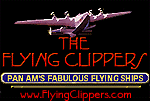

|


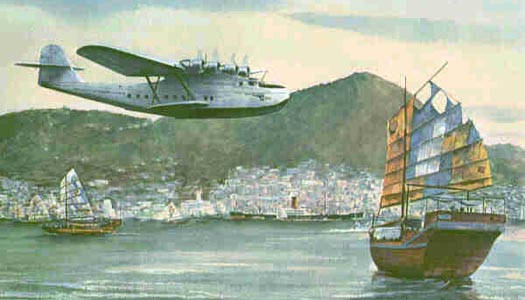
Copyright © John McCoy
The Philippine Clipper arriving in Hong Kong to establish the first commercial air service between North America and the continent of Asia October 23, 1936
M130 China Clipper History
|
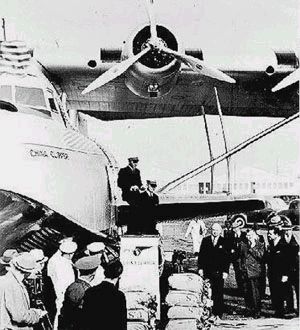 On November 22, 1935, in Alameda, California, Captain Edwin C. Musick and First Officer R.O.D. Sullivan stand next to the China Clipper before it leaves San Francisco for Manila with the first transpacific airmail. On the ground, left to right are: Postmaster General James A. Farley, Assistant Postmaster General Harllee Branch, and Pan Am President Juan Trippe. |
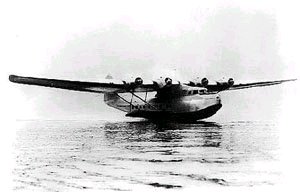 The China Clipper takes off from San Francisco on its maiden commercial flight across the Pacific Ocean to Manila in 1935.
The Crew of the China Clipper
November 22-29, 1935 | Edwin Musick
R.O.D. Sullivan
Fred Noonan
George King
C.D. Wright
Victor Wright
William Jarboe
| Captain
First Officer
Navigation Officer
Second Officer
First Engineering Officer
Second Engineering Officer
Radio Officer | |
|
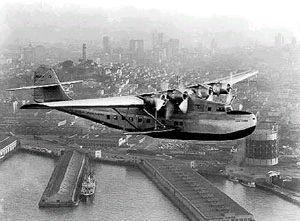
The China Clipper passes over the San Francisco waterfront. The aircraft completed the trip in six days, with a flying time of 59 hours, 48 minutes. Overnight stops included Honolulu, Midway, Wake Island, and Guam.
|
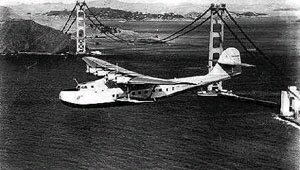
The China Clipper clears the Golden Gate Bridge (then under construction) as it begins to head out over the Pacific Ocean.
|
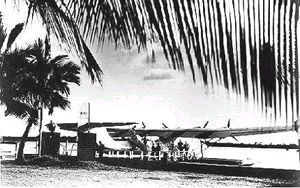
The China Clipper flight crew disembarks in Honolulu, Hawaii.
|
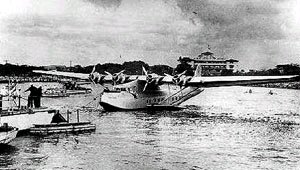
The China Clipper is anchored at a pier in Manila harbor, following its historic flight across the Pacific Ocean. Huge crowds lined the shore to catch a glimpse of the aircraft. The Manila Hotel can be seen in the background.
|
M130 Clipper Aviation Milestones
 The China Clipper inaugurates the first trans-Pacific airmail service on November 22, 1935 with 111,000 letters on board. It returned to San Francisco on December 6, 1935. The China Clipper inaugurates the first trans-Pacific airmail service on November 22, 1935 with 111,000 letters on board. It returned to San Francisco on December 6, 1935.
 The Hawaii Clipper inaugurates the first (revenue generating) scheduled transoceanic passenger service between California and the Philippines on October 21, 1936. The round trip flight was completed on November 4, 1936. The Hawaii Clipper inaugurates the first (revenue generating) scheduled transoceanic passenger service between California and the Philippines on October 21, 1936. The round trip flight was completed on November 4, 1936.
 The Philippine Clipper inaugurates the first passenger service into Hong Kong on October 14, 1936. Really a public relations VIP flight, it landed in Hong Kong on October 23rd and returned to San Francisco on November 2, 1936. The Philippine Clipper inaugurates the first passenger service into Hong Kong on October 14, 1936. Really a public relations VIP flight, it landed in Hong Kong on October 23rd and returned to San Francisco on November 2, 1936.
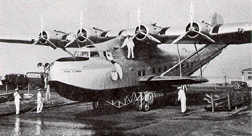 Martin M-130 Clipper Data Sheet Martin M-130 Clipper Data Sheet
Flying boat, 1934 |
| Development: | Built by the Glenn L. Martin Company, they were known by the company as Martin Ocean Transports. The aircraft first flew on December 30, 1934. Only three of these aircraft were built, the China Clipper, the Philippine Clipper and the Hawaii Clipper. To the public, China Clipper became a generic name and originally was applied to all three of the Martin M-130's in Pan Am's fleet and, later, even to the Boeing B-314's. |
| Service: |
With Pan American Airways. |
| Crew: | 5 and eventually 8 |
| Wingspan: | 130 feet / 39.7 m |
| Length: | 90 feet 10.5 inches / 27.7 m |
| Height: | 24 feet 7 inches / 7.5 m |
| Gross Weight: | 52252 lbs / 23701 kg |
| Engines: | 4x Pratt & Whitney R-1830-S2A5G Twin Wasp 14-cylinder Radial Engines (830 horsepower each - later 950 hp with hydromatic propellers) |
| Maximum Speed: | 180 mph |
| Cruise Speed: | 163 mph |
| Cruise Ceiling: | 17000 feet / 5182 m |
| Range: | 3200 miles / 5150 km |
| Payload: | 18-46 (18 night) passengers |
| The Flying Clippers General Specifications Sheet |
IN THE MOVIES
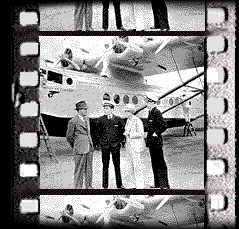
| Humphry Bogart and Pat O'Brian starred in a film called China Clipper. Released in 1936, it is currently owned by Turner Pictures and has not been released to video. At left, is a scene from that movie, of preparations for the trans-pacific flight. Inspired by Lindbergh's flight,
Dave Logan sets out with a Washington-Philadelphia airline but suffers financial problems. With flying ace Hap Stuart he tries clipper ships on the Caribbean, then aims for the trans-Pacific route. The movie includes great footage of the M-130 in its recreation of the first trans-pacific flight by Pan American Airways. |


Copyright © 1999-2004 Flying Clippers All Rights Reserved
All materials contained in http://www.flyingclippers.com are protected by copyright and trademark laws and may not be used for any purpose whatsoever other than private, non-commercial viewing purposes. Derivative works and other unauthorized copying or use of stills, video footage, text or graphics is expressly prohibited.
|
|








 Martin M-130 Clipper Data Sheet
Martin M-130 Clipper Data Sheet 
